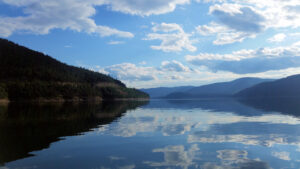
Kudos to Rachel Potter for spotting this excellent, comprehensive article . . .
With the timer running out on a self-imposed deadline for Canada and the United States to “reduce and mitigate” mining-related pollution in the Kootenai River watershed, environmentalists and tribal governments are wondering if threatened fisheries in British Columbia, Montana and Idaho are any closer to stronger protections.
At issue is Teck Coal’s mountaintop removal coal-mining operation in Canada, which has introduced selenium pollution into Lake Koocanusa and its tributaries. A 92-mile-long reservoir that straddles the U.S.-Canada border, Lake Koocanusa is protected under the Boundary Waters Treaty of 1909, which holds that “waters flowing across the boundary shall not be polluted on either side to the injury of health or property on the other.” Selenium, a chemical element that can hamper reproductive success in fish and lead to spinal, facial and gill deformities, has exceeded federal limits in burbot and mountain whitefish as far downstream as Bonners Ferry, Idaho, and is thought to have contributed to a 50% decline of mountain whitefish observed in Libby.
In a joint statement issued this March, President Joe Biden and Prime Minister Justin Trudeau pledged to “reach an agreement in principle by this summer” to address transboundary pollution concerns — and to work “in partnership with Tribal National and Indigenous Peoples” in that effort.
But the Confederated Salish and Kootenai Tribes, along with other Native American and First Nations governments of the Ktunaxa Nation, say their attempt to participate in those conversations has been met with silence from the Canadian government…